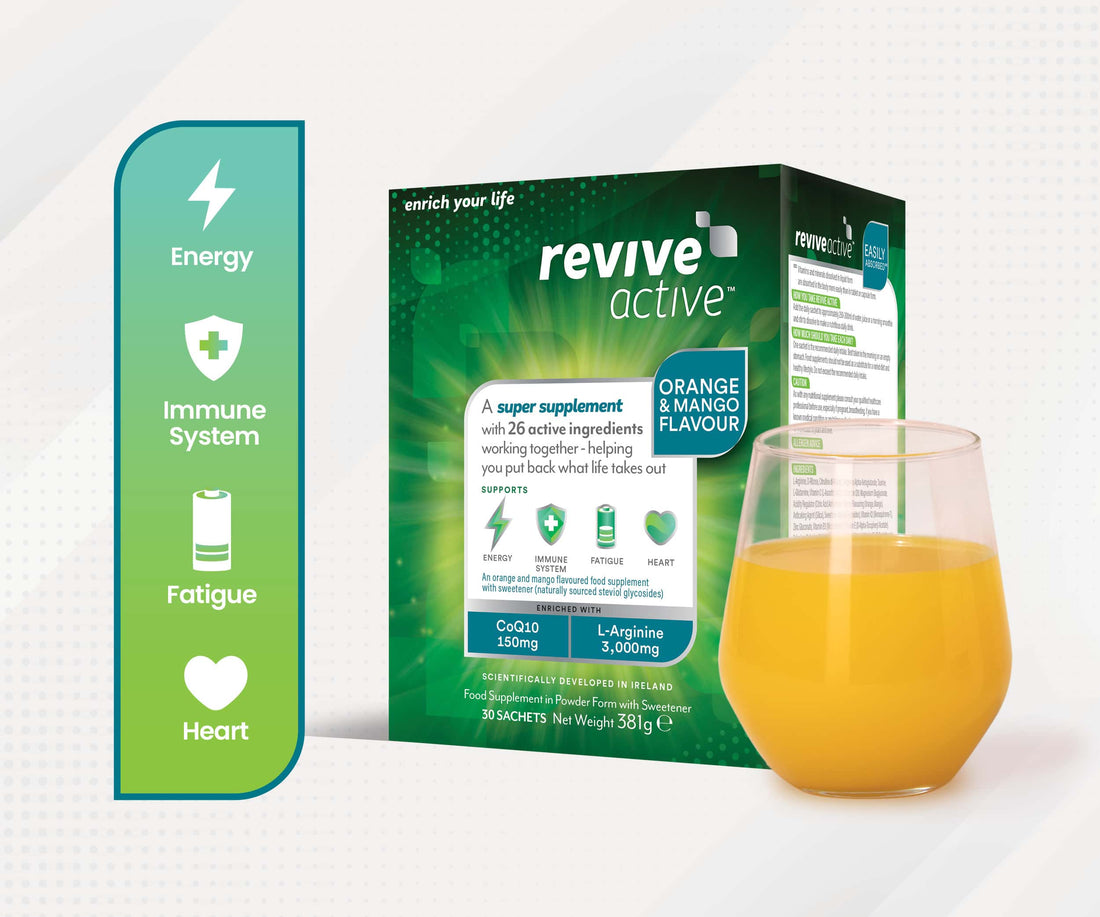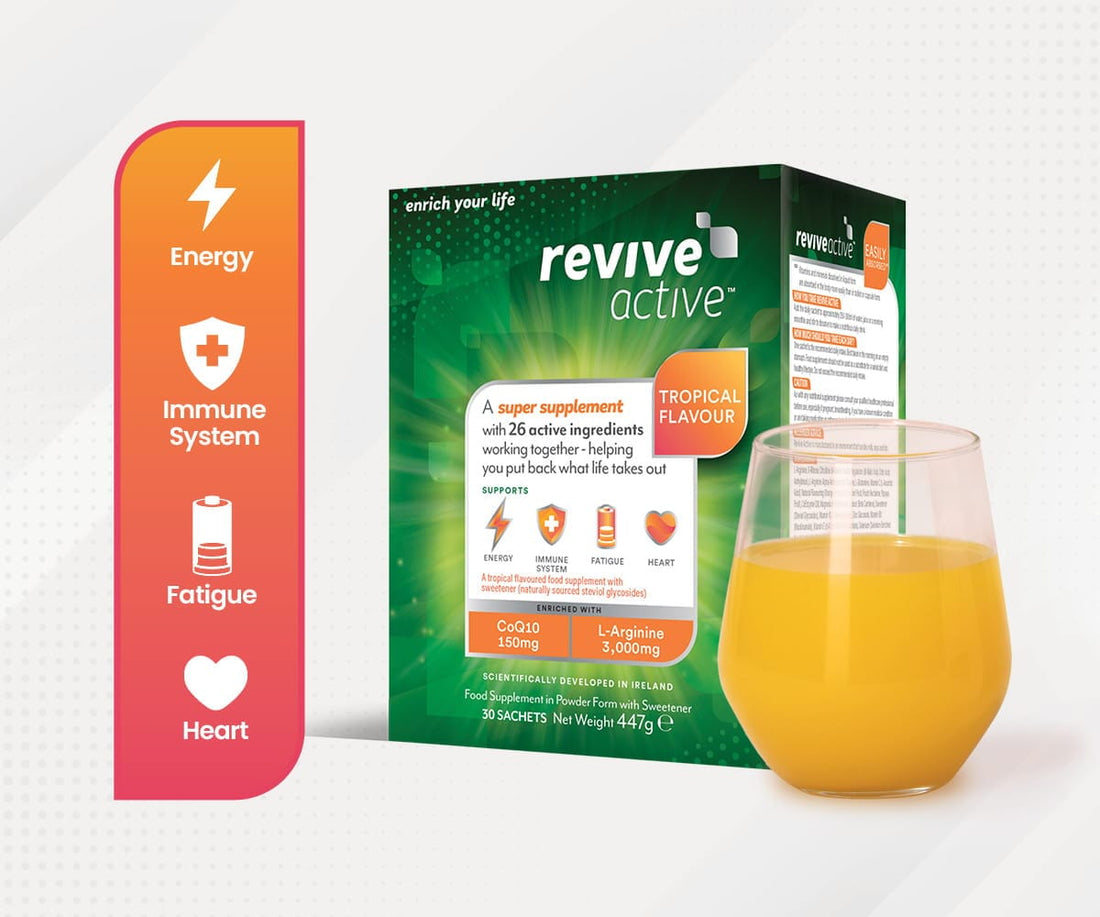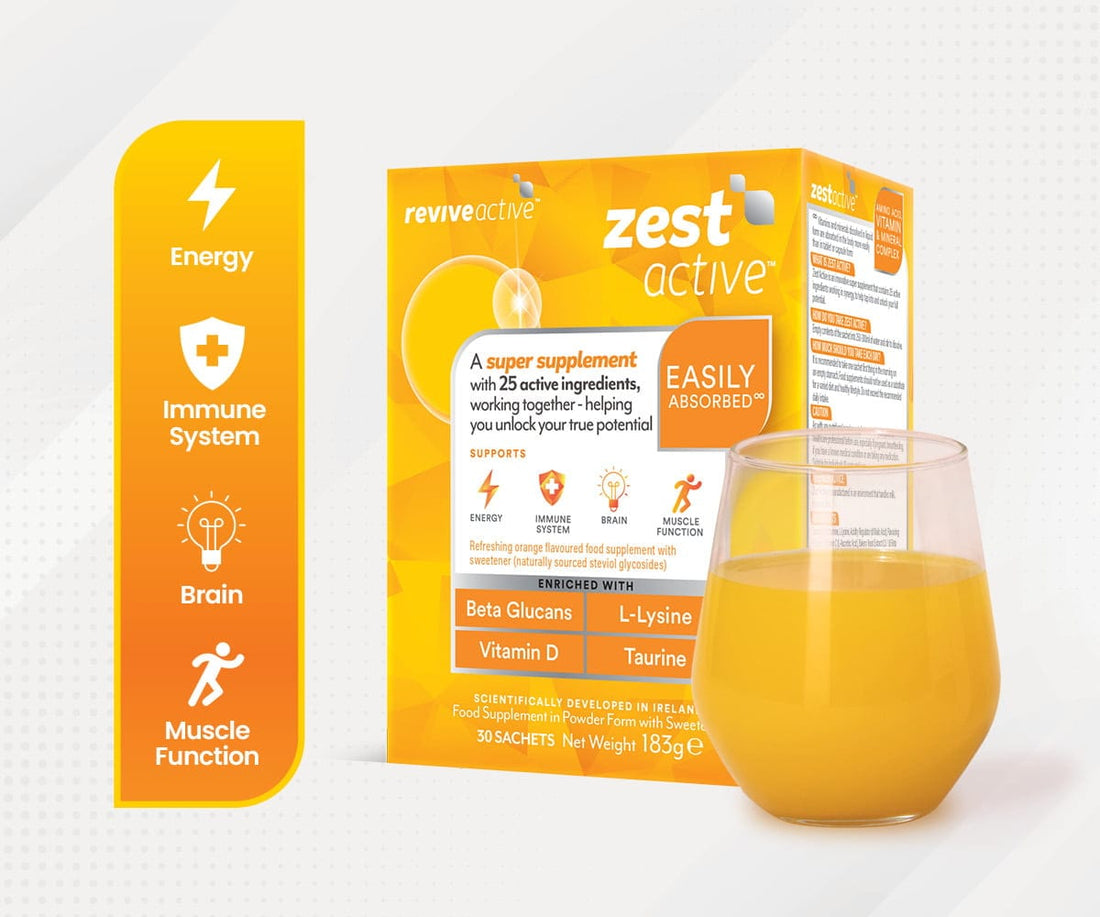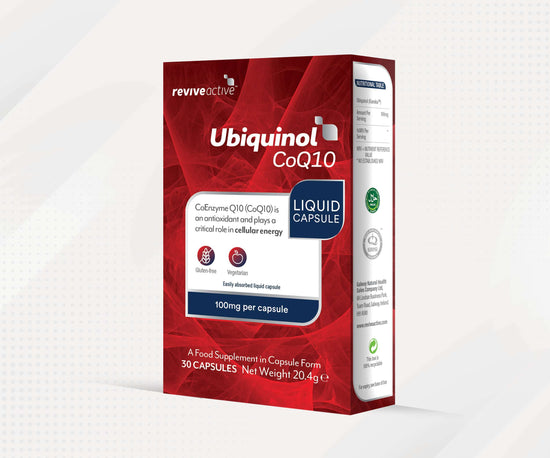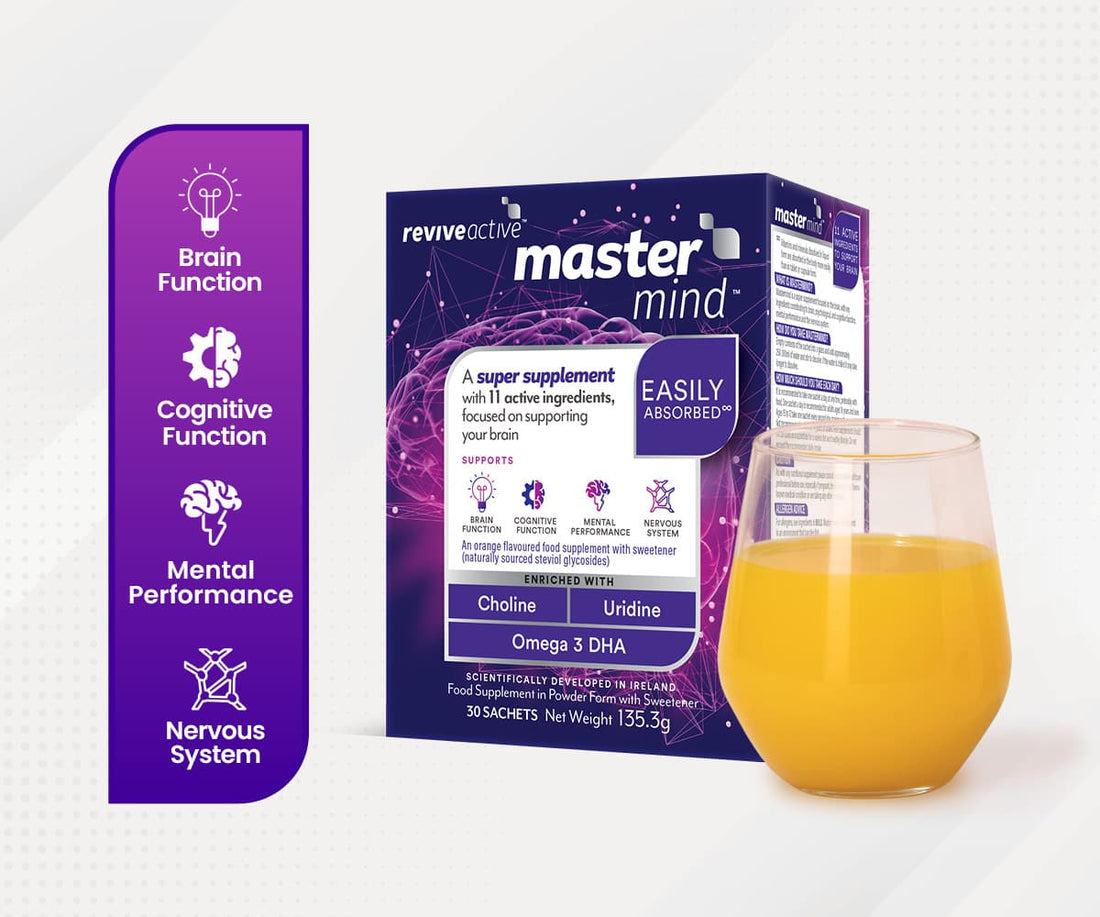What should you look for in a vitamin supplement for motivation?
Updated
In today's fast-paced environment, many individuals struggle to maintain energy and motivation throughout the day. Energy supplements are becoming increasingly popular, containing essential vitamins, nutrients and energy-boosting ingredients such as caffeine and amino acids.
This article will explore why you may feel unmotivated, ways to increase motivation and vitamins and supplements that can help boost motivation and energy levels. We will also compare the best energy supplements from Revive Active and how they can improve cognitive performance, reduce fatigue, and enhance mental performance.
Click on a link to jump to that section:
Lower energy levels and poor productivity habits can contribute to a lack of motivation.
Increase motivation and brain energy with these health and psychological tips.
We outline which ingredients to look for in an energy supplement.
Choose the best vitamin supplement for your needs from our range of energy supplements.
What can cause a lack of motivation?
You might feel unmotivated for several reasons, which can be categorised into physiological and mindset challenges. We address a few of these reasons in the table below.
|
Physiological |
Mindset/psychological |
|
Sleep deprivation or fatigue |
Undefined goals |
|
Mental clarity/brain fog |
Low dopamine when completing tasks |
|
Sedentary lifestyle |
Poor focus/short attention span |
|
Over-exercising (under-recovering) |
Unrestricted time frames for working |
|
Undereating |
Easy access to distractions |
|
A poor diet |
No scheduled breaks |

When you fatigue, it can be tough to focus on the task at hand; a lack of mental clarity or brain fog can also make it challenging to complete tasks efficiently.
A sedentary lifestyle and a poor diet can exacerbate the feeling of fatigue. Meanwhile, over-exercising, under-recovering and undereating can also lead to tiredness and an overall lack of motivation.
Your mindset and psychological habits may be the reason you have low motivation. Many of us struggle with a low attention span causing us to lose focus on tasks. Others might struggle to start or finish tasks due to undefined goals, timeframes or breaks.
Five ways to increase motivation and low energy?
Improving motivation can be challenging because the problem is usually multi-faceted with a combination of physiological and psychological causes. Here, we explore some techniques to help boost your energy.

Physiological
- Get enough sleep every night – get at least eight hours of sleep, try to sleep before midnight and aim to sleep and wake at a similar time every day.
- Avoid excessive caffeine consumption – caffeine disrupts the sleep cycle, and withdrawal can cause mental fatigue. To avoid this, consume coffee or energy drinks after a meal and not immediately after you wake up. Also, avoid late-night caffeinated beverages.
- Eat enough – Adults need at least 2,000 calories per day and a calorie deficit can contribute to fatigue. High protein, low fat diets are better for avoiding fatigue while in a calorie deficit.
- Take a vitamin & amino acid supplement to improve daily energy levels & cognitive function.
Mindset/psychological
- Set clear goals: When you set yourself achievable goals starting tasks can be less daunting. Write your assignments on a to-do list for the day and leave the remaining tasks for another time so that you aren't distracted by them.
- Set smaller goals: Starting tasks is always the most challenging part. If you agree, you may benefit from lowering your expectations. For example, if you set a goal to read two pages of a book, you will probably read on. However, reducing the perceived enormity of the task can make it easier to start. This technique can be applied to exercise, academic research, or even replying to emails.
- Set definitive timeframes: Setting small timeframes to work without distraction can be particularly helpful for a short attention span or poor focus. The Pomodoro technique utilises 25:5-minute increments for working and 'resting' to avoid distractions as you work. Setting internal deadlines or blocking your time can help with time management.
- Make completing tasks more enjoyable: Use digital to-do lists and watch your tasks disappear as you complete them. Alternatively, reward yourself with drinks, snacks or even five minutes of screen time after you complete each task. This approach can boost dopamine release when completing tasks.
Which vitamins should you take for motivation?
Vitamins are vital in maintaining energy levels, cognitive function which can affect motivation. Here are the best energy supplement vitamins to look out for.
- B vitamins – there are eight B vitamins: Thiamine (B1), Riboflavin (B2), Niacin (B3), Pantothenic Acid (B5), Vitamin B6, Biotin (B7), Folic Acid (B9) and Vitamin B12. These are all involved in normal energy metabolism and/or the reduction of tiredness and fatigue. Vitamin B5 contributes to normal mental performance and vitamin B12 and B6 for normal psychological function.
- Magnesium – this mineral contributes to the reduction of tiredness and fatigue, normal energy-yielding metabolism and nervous system and muscle function, among other things.
- Vitamin C – one of the most vital vitamins in the body; vitamin C contributes to the reduction of tiredness and fatigue and the normal energy-yielding metabolism, and nervous system function.
- Vitamin D – known as the sunshine vitamin, vitamin D vitamin contributes to normal muscle function and cell division.
- Zinc – this mineral helps to maintain normal cognitive function and metabolism.
- Copper – this mineral contributes to normal energy-yielding metabolism, nervous system function and iron transport around the body.
- Manganese – contributes to normal energy-yielding metabolism.
Which supplement is the best for productivity?
Revive Active is a leading energy supplement brand that can help boost energy levels and enhance cognitive performance. We offer several products, including Zest Active, Revive Active and Mastermind.
Zest Active is a dietary supplement containing essential vitamins and nutrients, including Zinc and B12, that contribute to normal cognitive and psychological function respectively and help to reduce tiredness and fatigue. Critically, this supplement also contains l-theanine, an amino acid found in green tea.

Revive Active is a supplement that contains essential b vitamins, amino acids and Coenzyme Q10. This food supplement helps to boosts energy levels and supports heart and immune health in older adults.
Mastermind is a cognitive support supplement designed to improve Brain function, cognitive function and mental performance. It contains a unique blend of essential vitamins and amino acids, including vitamin B12, DHA for normal brain function and taurine.
All our supplements are designed to deliver nutrients effectively. For example, Zest, Revive & Mastermind are powdered, and each daily sachet is to be mixed into water or a drink. Ubiquinol, on the other hand, benefits from a liquid capsule.

Shop related products
What to read next
Energy drinks vs caffeine-free alternatives | How to boost energy levels without caffeine.
Which Revive Active supplement is the best for energy? | A product review and comparison
The best energy supplement for fighting fatigue
Finding the best energy supplement for students
Finding the best energy supplement for athletes
Sources
- A Randomized Controlled Trial of the Effect of Aerobic Exercise Training on Feelings of Energy and Fatigue in Sedentary Young Adults with Persistent Fatigue
- Overtraining in Athletes
- Going to sleep at 10pm linked to lowered risk of heart disease
- Are we dependent upon coffee and caffeine? A review on human and animal data
- Association between energy drink intake, sleep, stress, and suicidality in Korean adolescents: energy drink use in isolation or in combination with junk food consumption
- High-Protein, Low-Fat, Short-Term Diet Results in Less Stress and Fatigue Than Moderate-Protein, Moderate-Fat Diet During Weight Loss in Male Weightlifters: A Pilot Study
- Vitamins and Minerals for Energy, Fatigue and Cognition: A Narrative Review of the Biochemical and Clinical Evidence
- Concepts and models of sleep regulation: an overview

